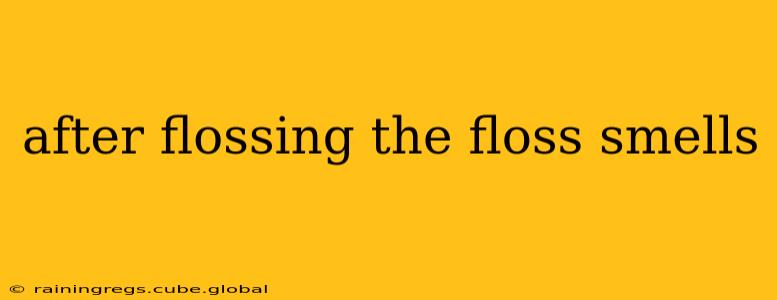Flossing is a crucial part of maintaining good oral hygiene, but sometimes you might notice an unpleasant smell after flossing. This isn't necessarily a cause for alarm, but it does indicate something is happening in your mouth. Understanding why your floss smells can help you address the underlying issue and improve your overall oral health. This guide will delve into the common causes and offer solutions to keep your mouth fresh and clean.
What Causes Floss to Smell After Flossing?
The smell after flossing often stems from bacteria and food particles trapped between your teeth. These particles, when broken down by bacteria, produce volatile sulfur compounds (VSCs), which are responsible for bad breath. The smell you detect on the floss is a direct result of these compounds. The intensity of the smell can vary depending on several factors, including dietary habits, oral hygiene practices, and underlying dental conditions.
Why Does My Floss Smell Bad Even After Brushing?
Even diligent brushing can leave some food particles and bacteria nestled between your teeth where your toothbrush can't reach. Flossing dislodges these hidden remnants, revealing the lingering odor. This highlights the importance of flossing as a supplementary step in your oral hygiene routine, not a replacement for brushing. The combination of brushing and flossing is essential for thorough cleaning.
Is it Normal for Floss to Smell?
A slight, almost imperceptible odor might be considered normal. However, a strong, unpleasant smell usually signals a problem. It could be indicative of poor oral hygiene, the presence of gingivitis (gum inflammation), periodontal disease, or other oral health issues. A consistently foul-smelling floss warrants a visit to your dentist for a professional checkup.
How Can I Prevent My Floss From Smelling?
Several strategies can help minimize or eliminate the smell of your floss after flossing:
Improve Your Flossing Technique:
- Use the right amount of floss: Don't use too much floss, as this can make it difficult to maneuver between your teeth effectively.
- Curve the floss around each tooth: Gently curve the floss around each tooth in a "C" shape, ensuring it reaches below the gum line.
- Use a fresh piece of floss for each tooth: Avoid using the same section of floss for multiple teeth, as this can spread bacteria.
Enhance Your Oral Hygiene Routine:
- Brush twice a day: Use fluoride toothpaste and brush for at least two minutes each time.
- Floss daily: Make flossing a regular part of your daily routine.
- Use mouthwash: A therapeutic mouthwash can help reduce bacteria and freshen breath. Check with your dentist for recommendations.
- Regular Dental Checkups: Visiting your dentist for regular checkups and cleanings is critical for maintaining optimal oral health and addressing any potential problems early on.
Dietary Considerations:
- Limit strong-smelling foods: Garlic, onions, and other pungent foods can contribute to bad breath.
- Stay hydrated: Drinking plenty of water helps wash away food particles and bacteria.
What Should I Do If My Floss Always Smells Bad?
Persistent bad breath or a consistently foul-smelling floss requires professional attention. Schedule an appointment with your dentist to rule out any underlying dental conditions, such as gum disease or cavities. They can provide a proper diagnosis and recommend the most suitable treatment plan.
Conclusion:
While a slight odor after flossing might be inconsequential, a consistently strong, unpleasant smell is a sign that you need to improve your oral hygiene practices or consult a dentist. By following the tips outlined above and maintaining a consistent oral hygiene routine, you can keep your mouth healthy, fresh, and free of unpleasant odors. Remember, your oral health is an integral part of your overall well-being. Prioritize it!
